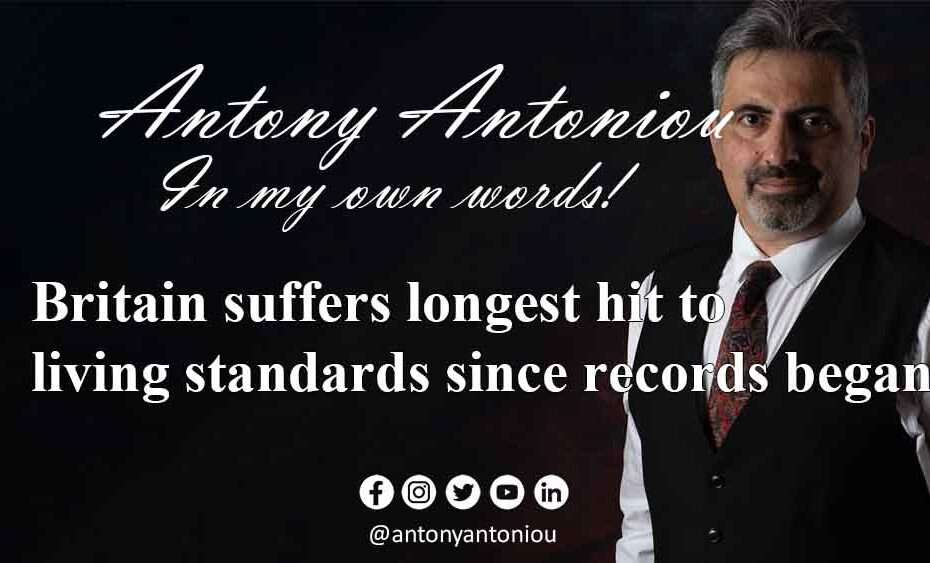Britain suffers longest hit to living standards since records began
Britain endures longest decline in living standards since records began
UK enters technical recession but economists caution it obscures bleaker image
Britain is going through the longest period of falling or stagnating living standards since records started in 1955, according to official data showing the economy is in recession.
The Office for National Statistics said output per person dropped sharply at the end of last year, meaning the economy has failed to grow since early 2022 after accounting for population growth.
This marks the longest hit to living standards since records began as economists warned the first technical recession since 2020 masked a far graver downturn in living standards.
The fall in GDP per head contributed to an overall 0.3% economic decline in the final three months of 2023, dealing a blow to Rishi Sunak as he prepares to fight a general election this year.
The decline was much steeper than predicted by analysts and follows a 0.1% drop in the prior three months. It signifies the UK has entered its first technical recession since the economy locked down four years ago.
GDP per head, which gauges economic growth adjusted for population size, is seen as a good indicator for living standards because when an economy generates more value per person annually, that generally translates into higher household incomes.
Grant Fitzner, the ONS’s chief economist, said: “What matters for living standards and ultimately things like public finances is whether, adjusted for population changes, you are growing or shrinking.”
Mr Fitzner also cautioned that economic inactivity was a major factor hindering growth. The UK remains the only G7 country yet to return to pre-pandemic employment levels.
He said: “If more people were working, consuming, producing, we would have higher GDP numbers. The fact activity fell significantly post-pandemic and has only partly recovered is one factor underpinning weaker growth. That would also underpin weaker consumer spending, with fewer people employed and spending.”
The data also showed the economy barely grew in 2023, expanding just 0.1% across the whole year.
Excluding the pandemic, this is the weakest annual growth since the 2009 financial crisis.
James Smith, research director at the Resolution Foundation, said: “The big picture is Britain remains a stagnation nation, with few signs of a recovery to get the economy out of it.”
Weaker growth implies the Bank of England may be compelled to cut interest rates faster to support the economy.
However, BoE policymaker Megan Greene warned Thursday there was no guarantee it would cut rates when inflation hit 2%. Ms Greene said consumer price rises falling to the BoE’s 2% target was insufficient to “declare victory” and start lowering borrowing costs.
Statisticians said the quarterly decline was driven by a broad fall across all sectors, including a 0.2% services drop and 1.3% construction fall in the final three months. Housebuilding has now declined for over a year.
The ONS said a large retail sales decline across the quarter hit the economy amid a disappointing Christmas season where households brought forward gift-buying for November’s Black Friday deals.
People also spent less on hair and beauty treatments over Christmas, the ONS said.
There was evidence more parents pulled children from school early before the holidays, highlighting ongoing attendance concerns since lockdown.
The figures come at the end of a crucial economic data week for the PM in which inflation stayed steady but rising sickness continued to hurt the economy.
It comes as Jeremy Hunt prepares his Budget next month. The Telegraph reported in January the Chancellor was prepared to squeeze departments further to allow tax cuts against a worsening economic backdrop.
The output drop last quarter suggests the Office for Budget Responsibility will likely downgrade its 0.7% growth forecast this year.
Rachel Reeves, the shadow chancellor, said Mr Sunak’s economic plan was now “in tatters”, with the PM failing to deliver on a pledge to grow the economy.
She added: “This is Rishi’s recession and the people will pay the price.”
Mr Hunt insisted there were “signs the economy is turning a corner”. He added growth would strengthen over coming years, wages were rising faster than prices, mortgage rates were down and unemployment remained low.
He said: “Although times are tough for many families, we must stick to the plan – cutting taxes on work and business to build a stronger economy.”
Separate figures from the European Commission suggest Germany’s economy will grow slower than expected this year, dealing a blow to Chancellor Olaf Scholz.
The Commission slashed its German growth forecasts for 2024 by over half, from 0.8% to 0.3%.
It warned high interest rates, labor shortages and weak confidence were constraining growth in Europe’s largest economy.
The Commission also said escalating Middle East conflict risked upending inflation fighting at a crucial time.
Further disruptions from Houthi attacks in the Red Sea “could bring renewed stress to supply chains, hampering production and adding price pressures,” it said in its winter forecast.

